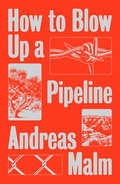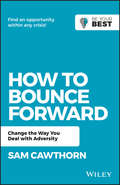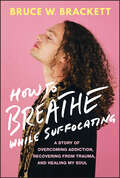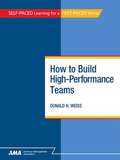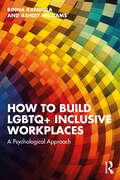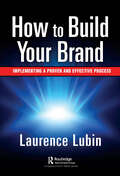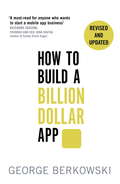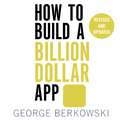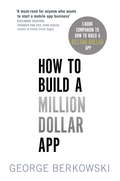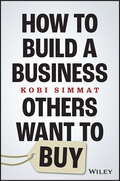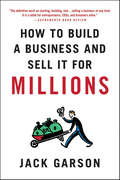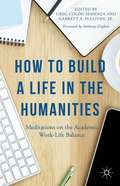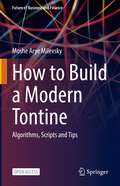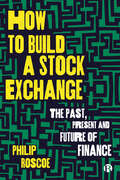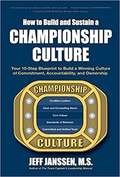- Table View
- List View
How to Become a Video Game Artist: The Insider's Guide to Landing a Job in the Gaming World
by Sam R. KennedyBecome a Player in the Business of Video Game ArtEvery year video games generate billions of dollars and some of the most dynamic and engaging artwork today. It's an ever-growing field that holds great professional opportunity, but you need the right skills and savvy if you want to stake your claim. In How to Become a Video Game Artist, veteran video game designer Sam R. Kennedy provides the inside track on everything you need to forge a career in the world of video game art. Starting with the basics of game creation and a look at the artistic skills necessary to get started, Kennedy spotlights specific, key roles for creators--from concept artists to character animators to marketing artists and beyond. Each chapter features screenshots from popular video games like Tom Clancy's Ghost Recon and World of Warcraft; interviews with video game art professionals who've worked for top gaming companies like BioWare, Blizzard, and Ubisoft; step-by-step examples of actual game art; and detailed breakdowns of the training and portfolio samples you'll need to make these jobs your own. For anyone who wants to go from gamer to game designer, this book contains all the secrets you'll need to rise to the top of one of the most exciting industries of our time.
How to Become a World-Class Manager: Skills and Insights for Unleashing Your Leadership Potential
by Wayne ClarkeWhether you're an aspiring manager, in middle management or a global executive, gain the skills, insights and confidence you need to become a world-class manager. Over 77% of organizations believe that effective leadership is lacking in the modern workforce. That leaves a huge opportunity for success for anyone who develops their skills to become a world-class manager. This ground-breaking book uncovers the secrets of success through key insights across all sectors and all disciplines of business, from time management and meetings to developing strategies and building a team. As a globally renowned leadership expert, Wayne Clarke brings his wealth of expertise to this book, distilling the key insights and skills from his globally bestselling course. Supported by a range of diverse case studies, How to Become a World-Class Manager will equip you with the skills and insights you need to take your career to new heights and reach the higher echelons of management.
How to Become an Accidental Entrepreneur (Accidental Series #3)
by Frieda Wishinsky Elizabeth MacLeodTake a risk! Find your niche! Get to work! How do entrepreneurs get ideas for a new business and how do they make their businesses thrive? What drives some entrepreneurs to use their ability and wealth to help others pursue their dreams and live better lives? Every entrepreneur has a unique story, but many share qualities that have helped them on their road to achievement. In How to Become an Accidental Entrepreneur readers will meet almost 100 entrepreneurs, such as Stephen Spielberg, Victoria Kisyombe, Oprah Winfrey and Amit Goffer, whose work has made a difference around the world. These entrepreneurs and more used their financial prosperity to help the world by giving donations or setting up charitable organizations. Young readers will discover the fascinating stories of people who turned obstacles into creative actions that allowed them to start new companies and create jobs for others. Praise for other books in the Accidental series: ★ “Engaging and thought-provoking, this book is a treasure trove of inspirational people and ideas." —Canadian Children's Book News, starred review "With many geniuses included and a good deal of space devoted to illustrations, each introduction is limited in length but usefully concise. An informative overview with an upbeat look and a lively text." —Booklist “This volume will inspire readers to conduct further investigation into the movements that excite them, and they might be spurred to stand up and make their voices heard.” —School Library Journal
How to Blow Up a Pipeline
by Andreas MalmProperty will cost us the earthThe science on climate change has been clear for a very long time now. Yet despite decades of appeals, mass street protests, petition campaigns, and peaceful demonstrations, we are still facing a booming fossil fuel industry, rising seas, rising emission levels, and a rising temperature. With the stakes so high, why haven't we moved beyond peaceful protest?In this lyrical manifesto, noted climate scholar (and saboteur of SUV tires and coal mines) Andreas Malm makes an impassioned call for the climate movement to escalate its tactics in the face of ecological collapse. We need, he argues, to force fossil fuel extraction to stop--with our actions, with our bodies, and by defusing and destroying its tools. We need, in short, to start blowing up some oil pipelines.Offering a counter-history of how mass popular change has occurred, from the democratic revolutions overthrowing dictators to the movement against apartheid and for women's suffrage, Malm argues that the strategic acceptance of property destruction and violence has been the only route for revolutionary change. In a braided narrative that moves from the forests of Germany and the streets of London to the deserts of Iraq, Malm offers us an incisive discussion of the politics and ethics of pacifism and violence, democracy and social change, strategy and tactics, and a movement compelled by both the heart and the mind. Here is how we fight in a world on fire.
How to Boost Your Credit Score 100+ Points In 30 Days Without Credit Repair!
by Brian DiezDid you know that you could have credit scores in the low 600's even if you never missed a bill payment in your life? That's because your payment history is only 35% of your credit score. "How to Boost You Credit score 100+ Points Without Credit Repair" will show credit industry secrets for maximizing the other 65%. The best part is you will see real results in just 30 days.
How to Bounce Forward: Change the Way You Deal with Adversity (Be Your Best)
by Sam CawthornHow to transform crisis into success At just 26 years old Sam Cawthorn experienced a serious car accident that resulted in the loss of his arm and was told that he may never walk again. At this critical moment he realised he had an incredible opportunity to create a better life. His experience drove him to uncover the mechanics, tools and strategies to not just bounce back, but to bounce forward and live a greater life with greater focus and greater success. How to Bounce Forward gives you the tools you need to successfully navigate crisis and use it to your advantage.
How to Breathe While Suffocating: A Story Of Overcoming Addiction, Recovering From Trauma, and Healing My Soul
by Bruce W. BrackettLet go of negativity, rediscover your inherent worth, and unlock your true potential How To Breathe While Suffocating is your antidote to the all-too-common tendency to surrender, giving up on your life’s ambitions. You don’t have to give up! For anyone who has gotten caught in the trap of “I can’t do it,” this book reminds you that you are enough, you possess value, and your unique ability to engage with the world can and will get you to where you want to be. Through simple positive affirmations, unflinching first-person stories, and insightful analysis, author Bruce W. Brackett helps you focus on the positive and keep moving forward. Society today is experiencing a hidden pandemic of loneliness, disconnection, and resistance to recovery. After the life-altering shutdowns of COVID-19, many of us have simply remained in shutdown mode. This book uses universal concepts, expressed through engaging narrative, to help you grapple with issues like mental health, isolation, gender identity, disconnection, and the overwhelming sense of negativity for our collective future. By the end, you’ll learn to turn it around and get back to the business of living. The message of How to Breathe When Suffocating is simple—spread love, inhabit joy, and embrace the power of positivity. · Gain the inspiration you need to seize your potential, find confidence, and step into your authentic self · Change your outlook on life with simple slogans and mantras for developing a healthier, more positive attitude · Realize that you aren’t alone in your struggle, and see how others are finding the strength to move forward in difficult times · Read the compelling story of one man who overcame insurmountable odds and found salvation from negativity and self-doubt After a two-decade healing journey of intensive trauma therapy, psychiatric treatment, and rehab, Bruce W. Brackett has emerged a survivor. Anyone in the midst of their own healing journey will resonate with benefit from his lived experience, portrayed here with intimate vulnerability and universal appeal.
How to Build High-Performance Teams
by Donald H. WeissHere’s a step-by-step process to recruit, empower and lead teams. How to Build High-Performance Teams focuses on the how-to keys of team-building—from recruiting the right team members to truly empowering them with authority and responsibility for their decisions and performance. You’ll understand how to build trust, confidence, and group work skills, balancing and fine-tuning the team process as you go. You'll learn how to: • Build and manage teams that live up to their promise of higher productivity and greater problem-solving ability • Maximize team productivity by encouraging group discussion and problem-solving • Overcome organizational, management and employee barriers to teamwork • Manage interpersonal conflicts among team members
How to Build LGBTQ+ Inclusive Workplaces: A Psychological Approach
by Binna Kandola Ashley WilliamsBringing together the latest research with practical insights from the authors’ professional experience, this important book provides a context for the conversations that are needed within organisations and offers practical guidance towards action that can be taken to improve the working life of LGBTQ+ employees.The book begins by asking how we got here. It outlines the development of stigma towards the LGBTQ+ community from both a historical and psychological perspective before going on to explore the ways in which societal attitudes manifest in the work environment. It then looks specifically at LGBTQ+ experiences in the workplace, covering discrimination and exclusion and their impact at both an individual and organisational level before taking an intersectional view of LGBTQ+ identity, and particularly how it interacts with race, disability and age. The book then provides clear and practical guidance on how to build an LGBTQ+ inclusive workplace, covering organisational policy and culture, leadership and allyship. Throughout, the authors use case studies to demonstrate how to implement policies across a range of regions and offer strategies to minimise homophobic and discriminatory attitudes.Taking a psychological approach to this important topic, the book is essential reading for all those looking to build and sustain welcoming and inclusive workplaces across all sectors. It will also be of interest to students in psychology, management and human resources studying workplace attitudes and culture.
How to Build Your Brand: Implementing a Proven and Effective Process
by Laurence LubinBrand Strategy is the most important marketing talent. A 2020 Gartner Survey of 400 CMO's cited Brand Strategy as the most needed skill, more valuable than analytics, UX, digital commerce. Previous books on the subject analyze the qualities and characteristics of well-regarded brands. What these books don't offer are the "how to's" of branding. This book empowers readers by teaching them the author's unique, time-tested Success Model, and step-by-step, repeatable method for successful brand building. After reading this insightful book, you will learn how to: Develop "big picture" insight that inspires big brand ideas Use imagery to understand the fundamental human values that give our life meaning as well as learn about the feelings that reveal our hopes and dreams. Develop highly motivating brand concepts that link to our values and aspirations. Create the tactical roadmap to implement the concepts. The author clearly shares the: Success Model that defines the world's most successful brands. Case studies that demonstrate the Model in action.Step-by-step method to implement the model. The evidence -- scientific and psychological --.that supports the model and method. Essentially, this book empowers readers to become skilled brand builders enabling them to succeed personally, socially, and professionally.
How to Build Your Brand: Implementing a Proven and Effective Process
by Laurence LubinBrand Strategy is the most important marketing talent. A 2020 Gartner Survey of 400 CMO's cited Brand Strategy as the most needed skill, more valuable than analytics, UX, digital commerce. Previous books on the subject analyze the qualities and characteristics of well-regarded brands. What these books don't offer are the "how to's" of branding. This book empowers readers by teaching them the author's unique, time-tested Success Model, and step-by-step, repeatable method for successful brand building. After reading this insightful book, you will learn how to: Develop "big picture" insight that inspires big brand ideas Use imagery to understand the fundamental human values that give our life meaning as well as learn about the feelings that reveal our hopes and dreams. Develop highly motivating brand concepts that link to our values and aspirations. Create the tactical roadmap to implement the concepts. The author clearly shares the: Success Model that defines the world's most successful brands. Case studies that demonstrate the Model in action.Step-by-step method to implement the model. The evidence -- scientific and psychological --.that supports the model and method. Essentially, this book empowers readers to become skilled brand builders enabling them to succeed personally, socially, and professionally.For more information on this book, please visit: www.howtobuildyourbrand.net
How to Build a Billion Dollar App: Discover the Secrets of the Most Successful Entrepreneurs of Our Time
by George BerkowskiTHE ULTIMATE GUIDE TO BUILDING AN APP-BASED BUSINESS - NOW REVISED AND UPDATED FOR 2017'A must read for anyone who wants to start a mobile app business' Riccardo Zacconi, founder and CEO King Digital (maker of Candy Crush Saga) 'A fascinating deep dive into the world of billion-dollar apps. Essential reading for anyone trying to build the next must-have app' Michael Acton Smith, Founder and CEO, Mind Candy Apps have changed the way we communicate, shop, play, interact and travel and their phenomenal popularity has presented possibly the biggest business opportunity in history.In How to Build a Billion Dollar App, serial tech entrepreneur George Berkowski gives you exclusive access to the secrets behind the success of the select group of apps that have achieved billion-dollar success.Berkowski draws exclusively on the inside stories of the billion-dollar app club members, including Instagram, Whatsapp, Snapchat, Candy Crush and Uber to provide all the information you need to create your own spectacularly successful mobile business. He guides you through each step, from an idea scribbled on the back of an envelope, through to finding a cofounder, building a team, attracting (and keeping) millions of users, all the way through to juggling the pressures of being CEO of a billion-dollar company (and still staying ahead of the competition).If you've ever dreamed of quitting your nine to five job to launch your own company, you're a gifted developer, seasoned entrepreneur or just intrigued by mobile technology, How to Build a Billion Dollar App will show you what it really takes to create your own billion-dollar, mobile business.
How to Build a Billion Dollar App: Discover the secrets of the most successful entrepreneurs of our time
by George BerkowskiTHE ULTIMATE GUIDE TO BUILDING AN APP-BASED BUSINESS 'A must read for anyone who wants to start a mobile app business' Riccardo Zacconi, founder and CEO King Digital (maker of Candy Crush Saga) 'A fascinating deep dive into the world of billion-dollar apps. Essential reading for anyone trying to build the next must-have app' Michael Acton Smith, Founder and CEO, Mind Candy Apps have changed the way we communicate, shop, play, interact and travel and their phenomenal popularity has presented possibly the biggest business opportunity in history.In How to Build a Billion Dollar App, serial tech entrepreneur George Berkowski gives you exclusive access to the secrets behind the success of the select group of apps that have achieved billion-dollar success.Berkowski draws exclusively on the inside stories of the billion-dollar app club members, including Instagram, Whatsapp, Snapchat, Candy Crush and Uber to provide all the information you need to create your own spectacularly successful mobile business. He guides you through each step, from an idea scribbled on the back of an envelope, through to finding a cofounder, building a team, attracting (and keeping) millions of users, all the way through to juggling the pressures of being CEO of a billion-dollar company (and still staying ahead of the competition).If you've ever dreamed of quitting your nine to five job to launch your own company, you're a gifted developer, seasoned entrepreneur or just intrigued by mobile technology, How to Build a Billion Dollar App will show you what it really takes to create your own billion-dollar, mobile business.
How to Build a Billion Dollar App: Discover the secrets of the most successful entrepreneurs of our time
by George BerkowskiTHE ULTIMATE GUIDE TO BUILDING AN APP-BASED BUSINESS 'A must read for anyone who wants to start a mobile app business' Riccardo Zacconi, founder and CEO King Digital (maker of Candy Crush Saga) 'A fascinating deep dive into the world of billion-dollar apps. Essential reading for anyone trying to build the next must-have app' Michael Acton Smith, Founder and CEO, Mind Candy Apps have changed the way we communicate, shop, play, interact and travel and their phenomenal popularity has presented possibly the biggest business opportunity in history.In How to Build a Billion Dollar App, serial tech entrepreneur George Berkowski gives you exclusive access to the secrets behind the success of the select group of apps that have achieved billion-dollar success.Berkowski draws exclusively on the inside stories of the billion-dollar app club members, including Instagram, Whatsapp, Snapchat, Candy Crush and Uber to provide all the information you need to create your own spectacularly successful mobile business. He guides you through each step, from an idea scribbled on the back of an envelope, through to finding a cofounder, building a team, attracting (and keeping) millions of users, all the way through to juggling the pressures of being CEO of a billion-dollar company (and still staying ahead of the competition).If you've ever dreamed of quitting your nine to five job to launch your own company, you're a gifted developer, seasoned entrepreneur or just intrigued by mobile technology, How to Build a Billion Dollar App will show you what it really takes to create your own billion-dollar, mobile business.
How to Build a Billion Dollar App: E-Book Companion To How To Build A Billion Dollar App
by George BerkowskiApps have changed the way we communicate, shop, play, interact and travel and their phenomenal popularity has presented possibly the biggest business opportunity in history. In How to Build a Billion Dollar App, serial tech entrepreneur George Berkowski - one of the minds behind the internationally successful taxi hailing app Hailo - gives you exclusive access to the secrets behind the success of the select group of apps that have achieved billion-dollar success. Berkowski draws exclusively on the inside stories of the billion-dollar app club members, including Instagram, Whatsapp, Snapchat, Candy Crush, Square, Viber, Clash of Clans, Angry Birds, Uber and Flipboard to provide all the information you need to create your own spectacularly successful mobile business. He guides you through each step, from an idea scribbled on the back of an envelope, through to finding a cofounder, building a team, attracting (and keeping) millions of users, all the way through to juggling the pressures of being CEO of a billion-dollar company (and still staying ahead of the competition). If you've ever dreamed of quitting your nine to five job to launch your own company or you're a gifted developer, seasoned entrepreneur or just intrigued by mobile technology, How to Build a Billion Dollar App will show you what it really takes to create your own billion-dollar, mobile business.
How to Build a Billion-Dollar Business: On Purpose. For Profit. With Passion.
by Radek SaliDiscover the strategies and secrets behind a billion-dollar Australian success story In How to Build a Billion-Dollar Business, former Swisse CEO Radek Sali unpacks how his unique approach to product, people, and branding took Swisse Wellness from an Australian favourite to a blockbuster brand that sold for $2.1 billion. At the heart of How to Build a Billion-Dollar Business is Radek’s passion for finding purpose in work. This book shares inspiring real-world strategies, stories, and insights on how to build a business that makes an astounding profit — but more than that, how to build a business that also does good. A successful business is not just about profit: it’s about culture. Inside, you’ll learn how to develop a business plan, foster loyalty and innovation in your team, build a thriving workplace culture rooted in values, and attract and retain customers who believe in your product and your mission. Build a culture of trust, openness, and respect — in your organisation as well as with your customer. Get timely and valuable insights on what it means to build a flexible business and a sustainable, responsible brand. Learn how to drive growth and sales reach by connecting with customers and driving an aspirational product or service. Build a business that makes a real social or environmental difference in your community, one that gives back and supports growth and wellness for all. From his early career days to his success as a serial entrepreneur and ethical investor, Radek Sali shares a blueprint for discovering what drives you and making your business goals a reality. How to Build a Billion-Dollar Business is a handbook for business owners everywhere, showing you how to succeed in creating positive change in your business and in the world.
How to Build a Business Others Want to Buy
by Kobi SimmatA 5-step blueprint for business brilliance In How to Build a Business Others Want to Buy, successful entrepreneur Kobi Simmat reveals how to build a profitable, attractive business and sell it for the payday of your dreams. As a business coach and accreditation expert, Kobi built a multi-million-dollar business around knowing exactly what sets a successful business apart from its competitors. In this book, he shares the secrets he learned on that journey. You’ll discover a 5-step process that starts with an idea and ends with a respected, sustainable brand that generates enviable profits. How to Build a Business Others Want to Buy shares templates, tips, and actionable insights that show you how to create systems for success. You’ll learn how to identify game-changing trends, and you’ll understand the 5 Ms that make or break a business: Mindset, Momentum, Management, Marketing, and Money. Fund and own your business, without relying on external investors Identify the top-15 drivers and metrics that make a business valuable Develop a scalable sales pipeline and recurring streams of revenue Attract desirable partnerships and win multi-million-dollar contracts from government and tier-one operators Discover best-practice tools and techniques for recruitment, coaching, and building a loyal, self-sufficient team that delivers resultsUltimately, you’ll learn how to build a business that will survive economic uncertainty and become a highly sought-after target — so you can sell it for a significant profit. How to Build a Business Others Want to Buy is a must-read for small business owners and entrepreneurs who want to grow their business the right way, with a lucrative end goal in mind.
How to Build a Business and Sell It for Millions
by Jack GarsonIn How to Build a Business and Sell It for Millions, MBA meets Main Street, with a combination of inspiration and invaluable practical advice. Finally, the positive economic news every businessperson is waiting to hear. Jack Garson says the long economic downturn will give way to a major buying spree by cash-rich companies—and they could be in the market to purchase your small or medium-sized business. It's the ultimate payday for everyone who wants to live the American dream, whether they're starting a business or already own one. Millions of dollars are on the table. But will you and your business be ready?How to Build a Business and Sell it for Millions is a must-read for every business owner and would-be entrepreneur. In entertaining and elaborate detail, Garson outlines the vital moves your company needs to make to become an attractive acquisition by other firms:· Do you have a competitive edge that sets you apart from your competition?· Are both you and your company sustainable and able to outlast the bad times to become a success? · Can you stop being a "Derek," the boss who suffers from "Founder's Dilemma," micromanaging everything big and small? How to Build a Business and Sell it for Millions uses real life examples to explain how the goal of selling your company needs to be linked to every business decision you make: hiring, compensation, contracts, financial reporting and dozens of other areas often overlooked by busy entrepreneurs. While many business owners struggle to get to the next day, Garson has the inside scoop on achieving the opportunity of a lifetime— selling your company for vast riches.
How to Build a Great Business in Tough Times: The King of Shaves story
by Will KingHOW TO BUILD A GREAT BUSINESS IN TOUGH TIMES is the inspiring entrepreneurial from-the-kitchen-table-to-supermarket-shelf story.Entrepreneur Will King hand-filled the first 10,000 bottles of his original King of Shaves (KoS) shaving oil at his kitchen sink, even getting his ironing lady to pitch in! From such humble beginnings, King of Shaves has grown to become a multi-million pound business. In 2008 a KoS product was sold every 3 seconds. Will explains how to keep the faith and follow your business dream even when the odds are heavily stacked against you.
How to Build a Life in the Humanities
by Jr. Garrett A. Sullivan Greg Colón SemenzaA follow-up to the popular Graduate Study for the 21st Century: How to Build an Academic Career in the Humanities, this book seeks to expand professional development to include the personal aspects of daily lives in the humanities. It does so in response to a conviction that the contemporary academy has given rise to a host of complex personal challenges which demand serious reflection due to their direct impact on us as scholars, pedagogues, and university citizens. A collection of 25 short essays by leading humanists in all stages of their careers, How to Build a Life in the Humanities will delve into such under-discussed academic "life" issues as: maternity leaves; tenure-track stress; adjunct exploitation; post-tenure depression; personal relationships; exercise and hobbies; managing ambition; administrative burdens; institutional politics; classism; racism; sexism; and identity politics, among others. These candid, illuminating essays combine practical wisdom with meditativereflections upon the challenges of academic life and will be of interest to humanists of all ranks, from potential or beginning graduate students to seasoned professionals.
How to Build a Million Dollar App: E-Book Companion To How To Build A Billion Dollar App
by George BerkowskiGeorge Berkowski, serial entrepreneur and one of the minds behind the internationally successful taxi hailing app Hailo, is the expert on mobile apps. In this free digital ebook companion to How To Build a Billion Dollar App, he includes an outline of the entire book and the chapters from step 1 of the journey, 'Building and Founding a Team', 'Validating Your Product' and 'Raising Seed Funding'. Through his experience, research and insights, readers will receive the beginning they need to start creating their very own Billion Dollar app!
How to Build a Modern Tontine: Algorithms, Scripts and Tips (Future of Business and Finance)
by Moshe Arye MilevskyThis open access book introduces the modern tontine and its applications in retirement and decumulation. Personal financial management in the later stages of life presents unique challenges, and renowned retirement planning expert Dr. Milevsky proposes the modern tontine as a solution. With the goal of guiding professionals and retirees in more efficient decumulation, the book demonstrates how to build a modern tontine. It is technically oriented, employing a cookbook format, featuring R code, and examining retirement planning through a statistical lens. This how-to guide, which is a sequel to his 2020 book “Retirement Income Recipes in R”, will be invaluable for retirement planning professionals and advisors, as well as for PhD scholars in retirement planning, quantitative finance, and related fields.This book is open access.
How to Build a Stock Exchange: The Past, Present and Future of Finance
by Philip RoscoeWhy is finance so important? How do stock markets work and what do they really do? Most importantly, what might finance be and what could we expect from it? Exploring contemporary finance via the development of stock exchanges, markets and the links with states, Roscoe mingles historical and technical detail with humorous anecdotes and lively portraits of market participants. Deftly combining research and autobiographical vignettes, he offers a cautionary tale about the drive of financial markets towards expropriation, capture and exclusion. Positioning financial markets as central devices in the organization of the global economy, he includes contemporary concerns over inequality, climate emergency and (de)colonialism and concludes by wondering, in the market’s own angst-filled voice, what the future for finance might be, and how we might get there.
How to Build an Online Business: Australia's Top Digital Disruptors Reveal Their Secrets for Launching and Growing an Online Business
by Bernadette SchwerdtThe ultimate guide to launching and growing an online business You’ve got a crazy idea, a hobby, a business or special expertise. You want to take it online, and you want to it be a money-making success. But what do you do next? Using a simple 5-step approach, best-selling author and digital marketing specialist Bernadette Schwerdt uncovers the inside tips and tricks that Australia’s most successful online entrepreneurs use to build their multi-million dollar businesses. For those just starting out, this book will help you identify the best business idea to pursue, guide you on how to set it up and give you the strategies to grow it quickly using low-cost tools. For those with existing businesses, you’ll learn how to maximise your online impact and access the little-known but powerful tools and technologies the top disruptors use to create a global presence. Featuring dozens of case studies of how Australia’s most successful disruptors have done it, Bernadette reveals the underlying patterns common to all successful online businesses – what they did right, what they did wrong, what they would do differently and the short cuts to building an online business that only the successful know. You’ll learn how to: Develop the entrepreneurial mindset needed to turn your passion, hobby or expertise into an online business Access free tools and technologies to help you build and test your online idea (before launching) to ensure a viable market exists Create a minimum viable product (MVP) that attracts attention and generates instant income Source web developers, designers and other important suppliers for a fraction of the usual cost Write, pitch, persuade and present like a professional to attract investors, customers and high-quality strategic partners Understand the basics of the Internet of Things, virtual reality, augmented reality and artificial intelligence and use these technologies to help your business create a point of difference Work from home and set up your online business in just a few hours a week Whether you are starting an online business or building on an existing one, How to Build an Online Business is your complete, how-to guide for making it a success.
How to Build and Sustain a Championship Culture
by Jeff JanssenThis groundbreaking book reveals the 6 Key Components that all Championship Cultures have in common based on Jeff Janssen’s work with over 25 NCAA National Championship and Final Four programs at Michigan, North Carolina, Stanford, Arizona, Notre Dame, Illinois, LSU, and Arkansas. Discover the 8 Kinds of Cultures and exactly which one is best for your team. Learn how to build a winning Culture of Commitment, Accountability, and Ownership in your program with Jeff s practical and proven 10-Step Blueprint for Building and Sustaining a Championship Culture! You ll learn how to: - create a winning Culture of Commitment, Accountability, and Ownership in your program - establish high Standards of Behavior that will hold people accountable - develop a winning culture using the Six Key Components of Championship Cultures - implement 17 Critical Cultural Systems that will define and drive your Championship Culture - create a highly desirable culture that attracts high level talent and quality athletes and staff - build a highly respected program that stands the test of time



